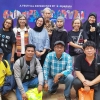The regime change changed the course of Indonesia. Now it is the turn of economic development to be commander in chief. The New Order took steps that succeeded in stabilizing and encouraging economic growth. One of the contributing factors is the two oil booms. The banking sector began to improve. The function of Bank Indonesia as the central bank was restored.
BI position
Formerly agents of revolution, now agents of development
Thanks to the increased foreign exchange reserves, BI and the government were able to provide various credit schemes.
What is prioritized is the productive sector so that inflation can be controlled. BI can also focus more on encouraging bank growth. The Monetary Council is active again, but only as a coordinating body.
The independence of Bank Indonesia is marked because it is outside the department, and the Governor of BI does not double as a minister.

PERIOD 4 (1983-1997)
Economic Globalization: The Disappearance of National Boundaries
"The mainstay of hope for driving the Indonesian economy in the 1980s was the non-oil and gas sector in a broad sense. The budget sector, as well as [soft] foreign loan, could not be relied upon, so the only hope and need to be encouraged was the public or private sector." -Arifin M. Siregar: Governor of Bank Indonesia, Suara Karya, 12-16 December 1989.
Country State














